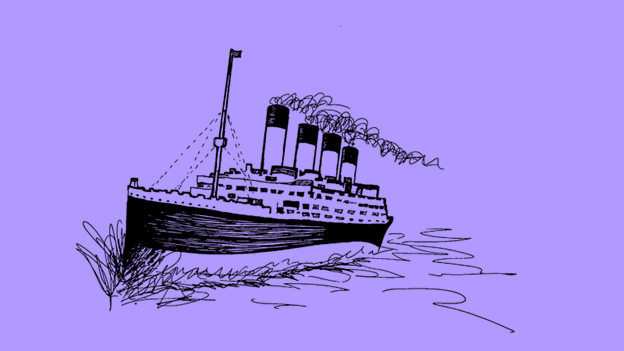What if I could slow down? (Reflections on the turning of the year)

By the time the Carpathia picked up the last of the survivors from overloaded Lifeboat 12, misinformation had already begun to spread. Instantaneous communication across the ocean had only been possible for a few years, thanks to Marconi’s magical wireless telegrams. But it had already fundamentally changed people’s expectations about the speed of information-sharing. Journalists, in their rush to oblige, often got things wrong.
Within a few hours, newspapers from the Christian Science Monitor to the Tampa Daily Times to Ogden, Utah’s Evening Standard were reporting that the S.S. Virginian was towing the Titanic to Halifax, Nova Scotia. Special trains were even chartered to meet the ship’s passengers there, and were already north of Boston when they learned the truth.
It wasn’t until nearly 24 hours after the sinking—and multiple rounds of headlines—that White Star Line’s representative announced the truth to an anxious and growing crowd outside its New York offices: The Titanic was gone, along with most souls on board.
On the morning of Rosh Hashanah, the Jewish New Year, services started at 8:30. But I didn’t set an alarm.
I met Danny on the (too small for both of us) loveseat in the living room where he was doing his crossword puzzle and snuggled up on top of him for a little while. Then I left for a long walk: a solo loop down to the riverwalk on both sides of the Mystic and back. I meandered, letting myself get distracted by little side paths in the wooded park on the Medford side, only taking out my phone to snap pictures of pretty things for Danny or to send shana tova (Happy New Year) messages.
*
Last year—our first living in this home—I would often leave the house at 6:45 am on Fridays to drive Danny to the bus stop, then take the car to Market Basket, armed with next week’s shopping list. I’d be in just after it opened at 7 and home before 8: the day still young, but already ahead on my chores for next week.
Why, though?
I derive pleasure from productivity. But that’s kind of… it.
Lately, that’s started to not seem like a good enough reason to rush.
Living in Hamburg, we walked everywhere. One of my casual resolutions upon returning was to try to walk more—which is to say, really, to try to take things at the speed of walking, sometimes.
So I’ve been experimenting with letting things take longer. Like walking to Market Basket (it’s only 1.1 mile by foot, after all), or, the other day, biking there and back, three cartons of milk jiggling in my big camping backpack.
And on Rosh Hashanah morning, despite the pull of the synagogue next door, I decided to stroll along the Mystic River first.
*
The night before, over dinner with my former housemates in Roxbury, the subject of AI came up. I started to feel my body flush with existential dread, as it does often these days. Ellen was worried about her job becoming obsolete. Danny told us about how his students increasingly rely on their devices to outsource critical thinking. Then Erica, on the other hand, told an anecdote about her friend using ChatGPT to design a stellar homeschool sex-ed class for her kids. We all paused to ponder the potential upsides to the AI revolution. And someone made the oft-repeated comment these days that AI is here, that we can’t put it back in the box, that we’ll have to learn how to live alongside it.
Why, though?
I think about how we have, collectively, moved on from technologies that felt inevitable when we as a society decided they weren’t worth the costs. We stopped producing chemicals that destroyed the ozone layer; we turned back the tide on cigarette smoking; right now, quietly, we are moving on from burning fossil fuels. All of these shifts have depended on people a) organizing and b) creating better technology. In the case of AI, though, the better technology is our brains—which have been evolving for hundreds of thousands of years and gotten us pretty far, and which now threaten to melt into mush from disuse.
I think about how some of the very people creating AI tools are betting against the possibility of humans and AI living alongside each other—prepping their bunkers, gathering guns, making space-escape plans out of fear of the future they’re building.
I think about how the assassination of Charlie Kirk has exposed, among many other things, the extent to which left and right can now live in full-blown separate, competing realities. The way that rumors and facts explode across the world, aided by AI-powered devices and unmitigated by truth or verification. Without equating the two political poles—and I say this as someone who identifies as part of the left—one feature both sides share is the accelerating inability to recognize the other as fully human. Which includes forgetting that we all share the very human possibility of learning and changing our minds.
I don’t think it can be a coincidence that this forgetting of others’ humanity is coinciding with the rise of our reliance on robots and machines to do our thinking for us—and do it faster, but getting it wrong too often, in the name of saving time, in the name of productivity.
*
I consider all this on my walk along the Mystic. But I’m not agitated. My meandering pace helps dissipate my anxiety and my usual impulse to try to figure out what to do about it all.
I come back feeling calmer than when I left—and nearly two hours late for services, too, but I’m hoping whoever’s up there listening to my slightly guilty prayers from the synagogue pews would agree that it was worth it.
It sure doesn’t look like we can put AI back in the box, or that its uptake will slow. It doesn’t look like anything about technology and communication in this world will slow down any time soon. Why would it? The pace of information-, misinformation-, and disinformation-sharing—and its real-life impacts—has only accelerated since Marconi made it possible for two faraway devices to communicate with each other through the air more than a century ago.
But I can slow down, at least a bit.
So as the year turns to 5786, I’m resolving to try to take things at the speed of walking. Not always, but a little bit more than before.
Love,
Ari
P.S. It seems important to acknowledge that there are applications of AI that have real potential to save lives. But just as the sensationalism and yellow journalism of the early 20th century, enabled in part by Marconi’s wireless, gave rise to fact-checking protocols and standards of journalistic integrity, I think it’s rational to hope that we may soon create safeguards that slow the roll of AI to its truly collectively beneficial uses—even if that feels improbable right now.
What else?
- Gaza on my mind, and probably yours. If you’re among those who haven’t spoken or acted on it out of fear of it coming out all wrong, my brilliant sister’s recent article is for you.
- I linked it above, but just in case, Bill McK’s latest on how the clean energy revolution is happening quietly all around us is one of the most genuinely hopeful things I’ve read in a whole while. (And if you have the opp to see him on book tour, you won’t regret it.)
- Apropos of nothing, a fun longread on Parmesan vs. Parmigiano Reggiano… and got me thinking about how culture and tradition are manufactured.
- Have you registered for No Kings part 2 yet? (Join me in Boston!) It’s gonna be big, maybe the biggest day of action yet—and not a moment too soon.

Member discussion